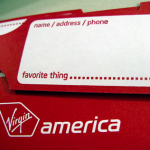Last weekend I had my first Virgin America flight to San Francisco; a flight that was given to me for free through a joint campaign between Virgin America and Klout because of my ‘influence‘ on Twitter. Now, I have already written a post with my opinions as to why this particular campaign was met with a lot of criticism on and off Twitter, and the areas where I think the campaign struggled. Once I sat down with Klout, we quickly realized that many of those areas could be rolled up into single issue: communication.
Klout was gracious enough to give an open invite to the winners of the campaign to stop by their office in San Francisco (where they have some great company in Twitter, Bebo and others — I met Ev in the hallway, a true San Francisco celebrity sighting), and with my interest in emerging technologies, I jumped at the chance. We went over the issues that I listed in my post, and while I could tell they certainly weren’t pleased with me, they gave me some truly valuable insight into not only the selection process for this particular campaign, but also their business.
What the Client Wants
 All marketing campaigns have a target demographic as determined by the client. In this case it was Virgin America and they wanted people who not only had influence, but were aligned with their brand and this particular campaign. Klout was the tool that took the data we pump daily into Twitter (think of all that data!) and used it to categorize and profile each and everyone one of us, allowing their client to pick and choose what type of person would be given a flight. Yes, the client wanted ‘influencers’ (anyone else hate that word yet?), but they also wanted people who spoke about the various destinations, among many other variables that they deemed important. Normally, it is rare that the target demographic for a campaign is so heavily questioned, but when dealing with a large number of users who like to talk a lot, it’s more than likely to be put under the microscope and heavily scrutinized.
All marketing campaigns have a target demographic as determined by the client. In this case it was Virgin America and they wanted people who not only had influence, but were aligned with their brand and this particular campaign. Klout was the tool that took the data we pump daily into Twitter (think of all that data!) and used it to categorize and profile each and everyone one of us, allowing their client to pick and choose what type of person would be given a flight. Yes, the client wanted ‘influencers’ (anyone else hate that word yet?), but they also wanted people who spoke about the various destinations, among many other variables that they deemed important. Normally, it is rare that the target demographic for a campaign is so heavily questioned, but when dealing with a large number of users who like to talk a lot, it’s more than likely to be put under the microscope and heavily scrutinized.
Word of Mouth
 Klout started off with an initial shortlist of hand picked users who had not only had high Klout scores, but that additional X-factor, if you will. From that list, it became a word of mouth trickle-down effect. They watched for people the original round of influencers were speaking to, and about. So really, it wasn’t just about the Klout score, or how influential each person was, it was a word of mouth marketing campaign. Sure, talking to or about Klout itself might have helped you get noticed, but once noticed, if you didn’t fit the criteria that the client deemed important, then you weren’t selected.
Klout started off with an initial shortlist of hand picked users who had not only had high Klout scores, but that additional X-factor, if you will. From that list, it became a word of mouth trickle-down effect. They watched for people the original round of influencers were speaking to, and about. So really, it wasn’t just about the Klout score, or how influential each person was, it was a word of mouth marketing campaign. Sure, talking to or about Klout itself might have helped you get noticed, but once noticed, if you didn’t fit the criteria that the client deemed important, then you weren’t selected.
Tip of the Iceberg
 After speaking with Klout it really became apparent to me that they were as transparent as they possibly could be, without putting themselves in competitive risk. Gregarious Narain, the VP of Product, put it best when he said “we are an iceberg”; the scores and summaries we see are just the surface of the data analysis and manipulation that goes on behind the scenes. The Content Analysis from our profiles are not specific keywords that we speak of, but categories in which these tags are grouped into. Furthermore, they are the most influential categories; so it’s not just what we say but more about what resonates with others. Klout puts a heavy emphasis on the limited focus it has on followers and following count, but more on what happens in each and every interaction.
After speaking with Klout it really became apparent to me that they were as transparent as they possibly could be, without putting themselves in competitive risk. Gregarious Narain, the VP of Product, put it best when he said “we are an iceberg”; the scores and summaries we see are just the surface of the data analysis and manipulation that goes on behind the scenes. The Content Analysis from our profiles are not specific keywords that we speak of, but categories in which these tags are grouped into. Furthermore, they are the most influential categories; so it’s not just what we say but more about what resonates with others. Klout puts a heavy emphasis on the limited focus it has on followers and following count, but more on what happens in each and every interaction.
Less Marketing, More Metrics
 We are willingly feeding Twitter, Facebook, YouTube and various other social networking sites personal information that if analyzed and manipulated properly, can provide extremely powerful insights into any individual. I imagine that Twitter is only the beginning of data analysis for Klout and other companies alike. Imagine a tool not only knowing what topics you are most influential based on your tweets, but even where your favourite hangouts are from Foursquare, your favourite bands from Last.Fm, your job from LinkedIn and even who you are friends with from Facebook. Companies will be able to target each and every one of us to such a fine detail that it’s one part terrifying and one part fascinating. (On a side note, think about how CSIS and the FBI could use this information).
We are willingly feeding Twitter, Facebook, YouTube and various other social networking sites personal information that if analyzed and manipulated properly, can provide extremely powerful insights into any individual. I imagine that Twitter is only the beginning of data analysis for Klout and other companies alike. Imagine a tool not only knowing what topics you are most influential based on your tweets, but even where your favourite hangouts are from Foursquare, your favourite bands from Last.Fm, your job from LinkedIn and even who you are friends with from Facebook. Companies will be able to target each and every one of us to such a fine detail that it’s one part terrifying and one part fascinating. (On a side note, think about how CSIS and the FBI could use this information).
In the end, it was a small communication misstep that has caused so much customer service and PR grief for a 10 man technology startup. The email said “Because you have so much Klout”, which led us all to believe that it was cut and dry; if you have a high Klout score, then you get the free flight. Even with the blog post that followed, people had already stopped listening, started whining and it was too late. Perhaps if the email had said something along the lines of “you met our criteria”, Twitter might have been a whole lot quieter with the complaining. Wishful thinking right?
Even so, something so small will not break a company that is currently knee deep in such powerful data. I am confident that they will learn from their mistakes, and the attention will shift away from the customer service and free flights, and back to the actual metrics.
